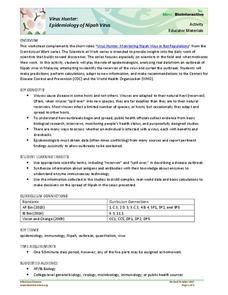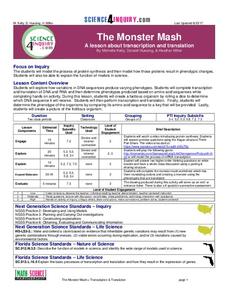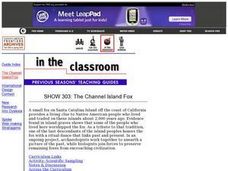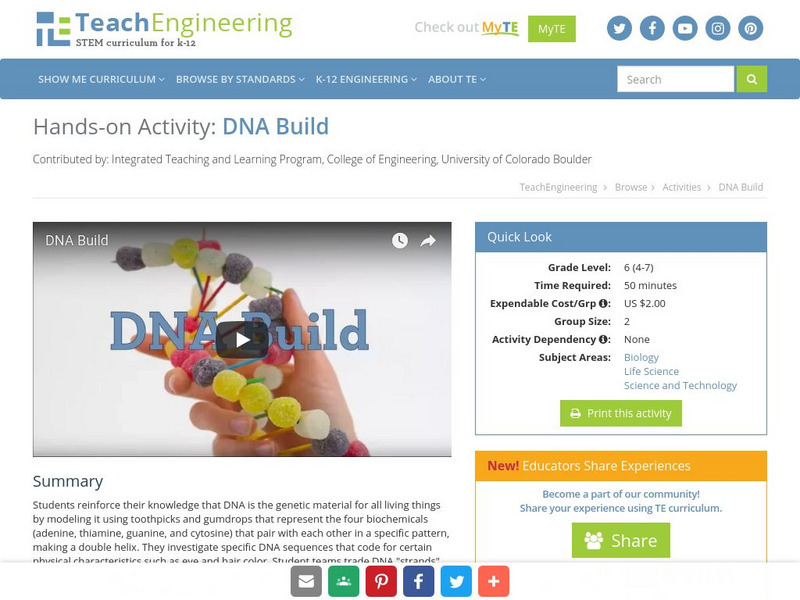Curated OER
A Hands-On Approach to Teaching the DNA Structure and Function
High schoolers investigate the structure of DNA, replication and transcription. In this DNA lesson plan, students build models of DNA using piper cleaners and paper clips. They demonstrate replication of DNA and transcription of DNA to...
Biology Junction
Protein Synthesis
Watson and Crick built the first model of DNA in the 1950s, and our understanding of DNA since then continues to grow exponentially. Scholars learn about protein synthesis by observing a presentation and completing a worksheet. Both walk...
Howard Hughes Medical Institute
Virus Hunters: Epidemiology of Nipah Virus
Who actually goes looking for a virus? Expose your class to the high-stakes life of an epidemiologist on the trail of the Nipah virus. Pupils engage in a short video, then examine how scientists predict, model, and find the source of...
Science 4 Inquiry
The Monster Mash
Young scientists create monsters by applying their knowledge of transcription and translation. They randomly find the DNA, assign it a codon, and build monsters piece by piece.
Science Friday
Colorful Chromosomes
Everything is in the genes. Individuals observe 14 different traits of themselves. Using pipe cleaners and beads, the learners create models of a chromosome representing their traits. The class then compares and contrasts everyone's...
Curated OER
Do You Know the Master Programmer?
Fourth graders, using candy, build models of DNA replication, RNA transcription, and tRNA translation.
Curated OER
Genetics and Heredity: The Next Generation
Tenth graders work in teams to order events of DNA transcription and translation protein synthesis. In the second lesson, they put the steps of mitosis and meiosis in order using a concept map poster. They use modeling clay to create...
Curated OER
Protein Synthesis
In this protein synthesis worksheet, students use a given strand of DNA to write the complimentary base pairs. They transcribe the message to the RNA and then they translate the message into the proper amino acids using the codons on the...
University of Colorado
Clay Planets
Why do scientists use models? In the first installment of 22, groups create scale models of our solar system. They then share and discuss their models.
Curated OER
DNA Replication
Students construct a 3-D model of DNA. They demonstrate an awareness of base pairs in written work and in a model. Students model DNA replication using edible materials. They record concluding thoughts in their science notebooks.
LABScI
Taxonomy: Who is in My family?
Find similarities in seemingly unlike organisms. The second instructional activity in a series of 12 builds the concept of a taxonomy and explores the use of a dichotomous key. Learners begin in part one by attempting to group a set of...
Curated OER
Edible DNA
Students use multicolored soft candies (gumdrops and candy orange slices) and toothpicks to create models of DNA structures. They discuss the fact that DNA must copy itself before splitting into two cells. Students demonstrate this by...
Kenan Fellows
Unit 1: Introduction to Biotechnology
Biotechnology is big! Introduce the uses of biotechnology to science scholars with a fascinating, fact-filled unit. The first installment in a series of four biotechnology units covers the role biotechnology plays in human and...
Agriculture in the Classroom
"Steer" Toward STEM: Careers in Animal Agriculture
Think like an engineer and an agricultural scientist over the course of 12 lessons in a STEM based unit. Young scientists take on the roles of animal physiologists, animal geneticists, agricultural engineers, animal nutritionists, and...
Curated OER
A Lab Trilogy for Beginning Biology Teachers
Young scholars are able to explain their models to other students and to their parents. Then young scholars like to decorate the room by hanging the models or constructing mobiles of a number of models.
Curated OER
Control of Prokaryotic (Bacterial) Genes
A nicely formatted set of slides that logically follow and define the structure and function of the genes in Bacteria. The repressor proteins and other gene regulators are listed and diagrams support the explanations of their function on...
Atkins
Attack of the Viruses!
Not all viruses are bad, but are all retroviruses groovy? The lesson starts with a detailed presentation before scholars create their own model of a virus. The resource incorporates many worksheets and practice questions to reinforce the...
Curated OER
Biotechnology Laboratory Research
Students participate in an extended laboratory research to experience how scientific information is obtained, upon which we build scientific knowledge and understanding.
Curated OER
Wolf Pack in a Bottle
Learners participate in an activity of a mock electrophoresis using paper chromatography to study DNA and genetic restriction mapping.
North Carolina State University
Exploring Genetics Across the Middle School Science and Math Curricula
Where is a geneticist's favorite place to swim? A gene pool. Young geneticists complete hands-on activities, experiments, and real-world problem solving throughout the unit. With extra focus on dominant and recessive genes, Punnett...
Curated OER
Basic Introduction to Foundation of Life: Genes, Genetics and Genetic Diseases
Students are introduced to genetics along with genetic diseases and heredity. In groups, they complete a Punnett Square to determine the dominant and recessive genes. After viewing diagrams, they identify the characteristics of DNA and...
Curated OER
SHOW 303: The Channel Island Fox
Students explore how archaeologists and other scientists use different clues to piece together a picture of the past. Students perform activities that allow them to conduct three types of scientific research. They discuss their...
American Museum of Natural History
American Museum of Natural History: O Logy: Stuff to Do: Make a Dna Model
Learn about DNA by building a model of its double-strand structure.
TeachEngineering
Teach Engineering: Dna Build
Students reinforce their knowledge that DNA is the genetic material for all living things by modeling it using toothpicks and gumdrops that represent the four biochemicals (adenine, thiamine, guanine, and cytosine) that pair with each...

























